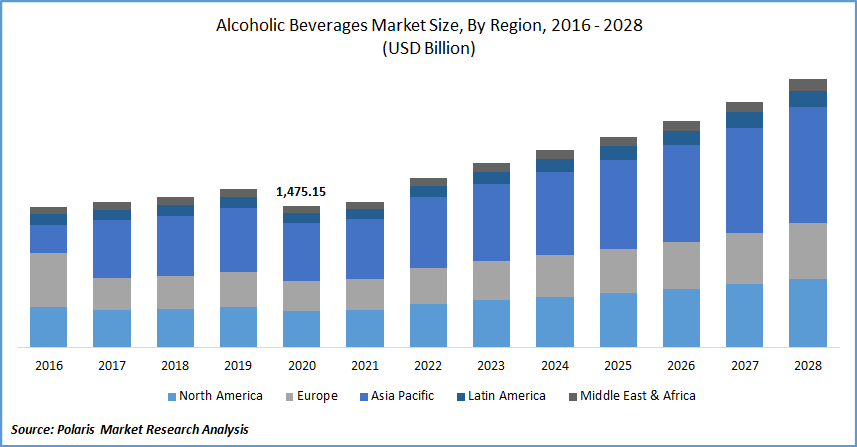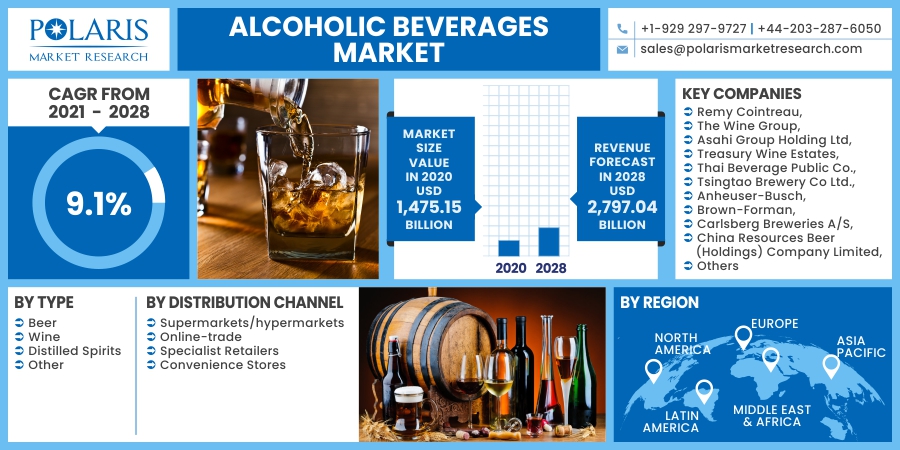
Alcoholic Beverages Market Share, Size, Trends, Industry Analysis Report, By Type (Beer, Wine, Distilled Spirits, Other); By Distribution Channel; By Region; Segment Forecasts, 2021 - 2028
- Published Date:Aug-2021
- Pages: 101
- Format: PDF
- Report ID: PM1941
- Base Year: 2020
- Historical Data: 2016-2019
Report Summary
The global alcoholic beverages market was valued at USD 1,475.15 billion in 2020 and is expected to grow at a CAGR of 9.1% during the forecast period. This market's growth is attributed to the consumption of alcoholic beverages in western regions and changing lifestyles among teenagers. Moreover, recent developments of premium products propelled the future growth of this industry. In addition, in developed countries, most consumers are curious to buy luxury brands' products that are likely to be primer drivers for industry growth for alcoholic beverages.
 Know more about this report: request for sample pages
Know more about this report: request for sample pages
The rapid explosion of COVID-19 disease globally is declining the demand of the industry. This is because the Coronavirus pandemic has impacted all major industries, but the restaurant and foodservice sector has been particularly hard hit. Due to these factors, most restaurants are being closed and creates a negative impact on the alcoholic beverages industry.
Industry Dynamics
Growth Drivers
It has been observed that the rising online platform for buying alcohol boosts the industry growth. There are several online websites to provide alcohol and wine distribution facilities and corporate parties for wine and beer service. There is also a significant distribution services facility from various manufacturers to several countries and local liquor stores and breweries. However, all online alcohol orders platforms across the globe must be made, shipped to, and processed by an adult who is 21 or older.
Alcohol producers are using digital marketing and advertisement as a medium to reach customers. The Centre for Alcohol Promotion and Youth (CAMY) in the U.S. finds that websites of alcohol distributors have a broad base of young people and provide content that is youth attractive.
All these alcoholic beverages' platforms are packed with sports, comics, music, and several high-tech downloads to encourage customers. Additionally, the home delivery service is exceptionally vital that is significantly contributing to the global alcoholic beverages market growth.

Know more about this report: request for sample pages
Alcoholic Beverages Market Report Scope
The market is primarily segmented on the basis of type, distribution channel, and region.
|
By Type |
By Distribution Channel |
By Region |
|
|
|
Know more about this report: request for sample pages
Insight by Type
The beer segment held the largest share in the global alcoholic beverages market in 2020 due to the growing demand for no and low alcohol beers. The introduction of the craft beer scene has experienced significant growth in the global alcoholic beverages industry.
The distilled spirits segment accounted for over one-third of the global revenue share for alcoholic beverages. The distilled spirits are highly demanded due to the rise in super-premium/premium whisky consumption and the demand shift from beer to distilled spirits such as vodka, rum, and others.
Furthermore, this segment is anticipated to offer high stability in terms of demand and return on investments for the stakeholders due to increased consumer demand and revenue contribution. This segment is further significantly contributing to the growth of the global industry.
Insight by Application
The supermarket/hypermarkets segment is expected to witness the highest CAGR during the forecast period. The rising number of supermarkets in almost all major cities and rapid urbanization in various emerging economies boost the distribution segments.
Moreover, the on-trade segment is expected to contribute the largest revenue by 2025 due to the high visibility and rise in disposable income of consumers, along with changes in preferences towards premium products propelled the market growth.
Geographic Overview
Geographically, Europe is the largest revenue contributor in the global market for alcoholic beverages due to the consumption of alcoholic products massively in the region. The demand for alcoholic beverages has been exceeded where spirit-based RTDs account for the greatest percentage of pure alcohol content in the three Baltic countries, the UK, Ireland, Poland, and Bulgaria. Countries that consume malt-based RTDs include Slovenia, Austria, Germany, and Romania. Wine-based RTDs are particularly popular in Finland, Spain, and Sweden.
According to European Union data, World Health Organization stated that Europe consumes more alcohol than any other country in the world, with each person consuming an average of 8.71 liters (roughly 25 beer-sized glasses of pure alcohol) each year, which is projected to boost the market growth in the region.
Furthermore, the prevalence of key players manufacturing alcoholic beverages in North America focuses on mid-priced (premium) spirits, driving the growth of beverages in this region. In the United States, off-premises retail sales accounted for about $113 billion in 2018 or around 47% of all liquor sales.
On-premises represented USD 147 billion in sales, about 53%. Additionally, Tequila had the largest growth, up more than 75%, confirming its place as the fastest-growing category in the U.S. alcoholic beverages industry.
Competitive Insight
Some of the local and regional players in the global market for alcoholic beverages are Remy Cointreau, The Wine Group, Asahi Group Holding Ltd, Treasury Wine Estates, Thai Beverage Public Co., Tsingtao Brewery Co Ltd., Anheuser-Busch, Brown-Forman, Carlsberg Breweries A/S, China Resources beer (Holdings) Company Limited, Diageo, Pernod Ricard, Remy Cointreau, SABMiller, and Bacardi, Accolade Wines, among others.
Report Scope
|
Report Attributes |
Details |
|
Market size value in 2020 |
USD 1,475.15 billion |
|
Revenue forecast in 2028 |
USD 2,797.04 billion |
|
CAGR |
9.1% from 2021 - 2028 |
|
Base year |
2020 |
|
Historical data |
2016 - 2019 |
|
Forecast period |
2021 - 2028 |
|
Quantitative units |
Revenue in USD million/billion and CAGR from 2021 to 2028 |
|
Segments covered |
By Product, By End-User, By Region |
|
Regional scope |
North America Europe Asia Pacific Latin America; Middle East & Africa |
|
Key Companies |
Remy Cointreau, The Wine Group, Asahi Group Holding Ltd, Treasury Wine Estates, Thai Beverage Public Co., Tsingtao Brewery Co Ltd., Anheuser-Busch, Brown-Forman, Carlsberg Breweries A/S, China Resources Beer (Holdings) Company Limited, Diageo, Pernod Ricard, Remy Cointreau, SABMiller, Bacardi, Accolade Wines |
License and Pricing
Purchase Report Sections
- Regional analysis
- Segmentation analysis
- Industry outlook
- Competitive landscape
Connect with experts
Suggested Report
- Lithium-Ion Battery Cathode Market Share, Size, Trends, Industry Analysis Report, 2020-2027
- Global Theranostics Market Research Report, Market size, Trend Analysis & Forecast, 2018 – 2026
- Concrete Repair Mortars Market Share, Size, Trends, Industry Analysis Report, 2021 - 2028
- Folic Acid Market Research Report, Size, Share & Forecast by 2019 - 2026
- Sports Mouthguard Market Share, Size, Trends, Industry Analysis Report, 2022 - 2030

